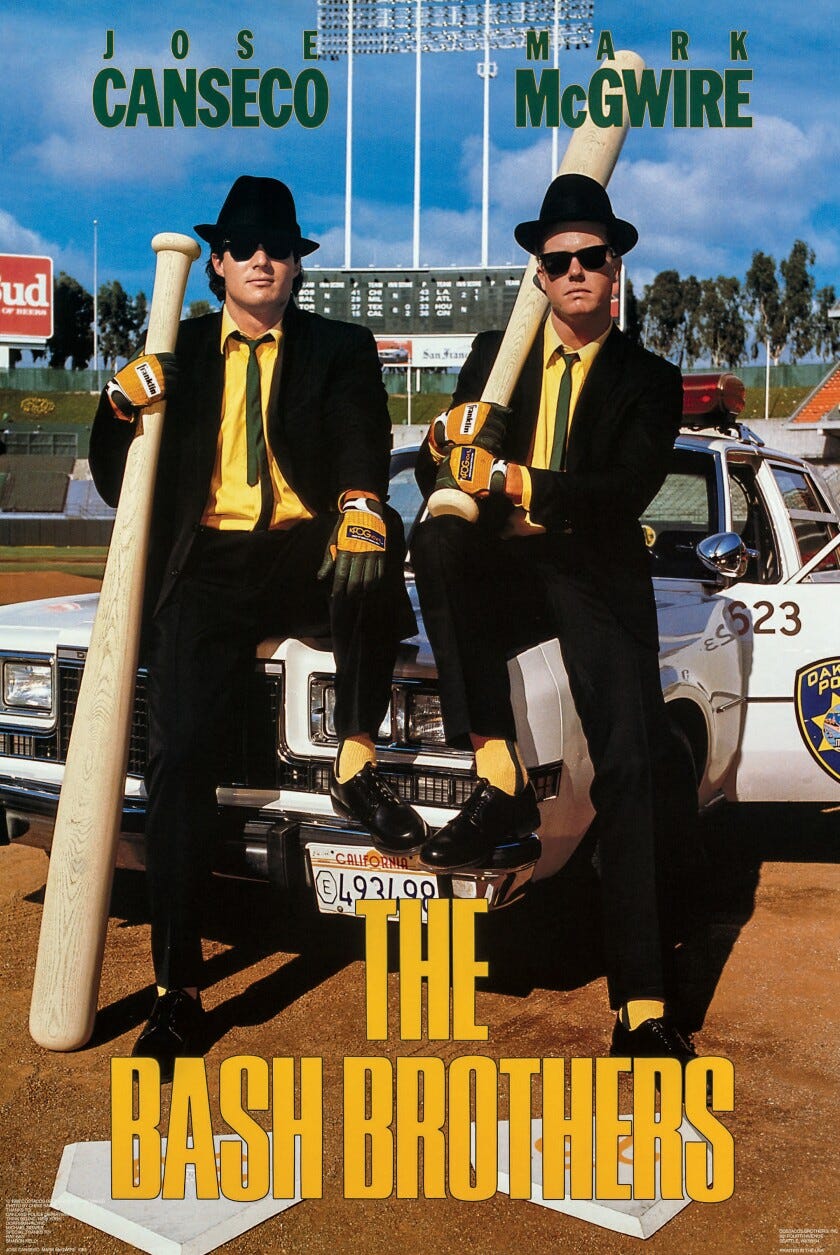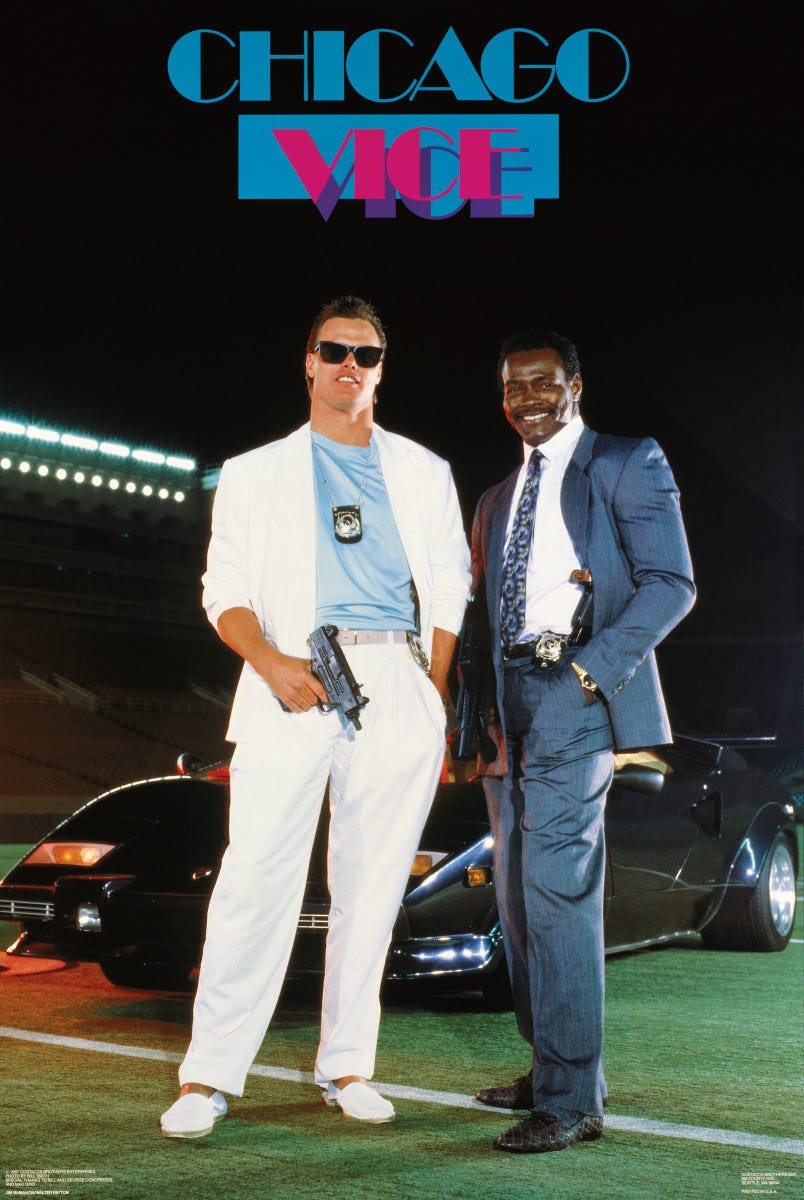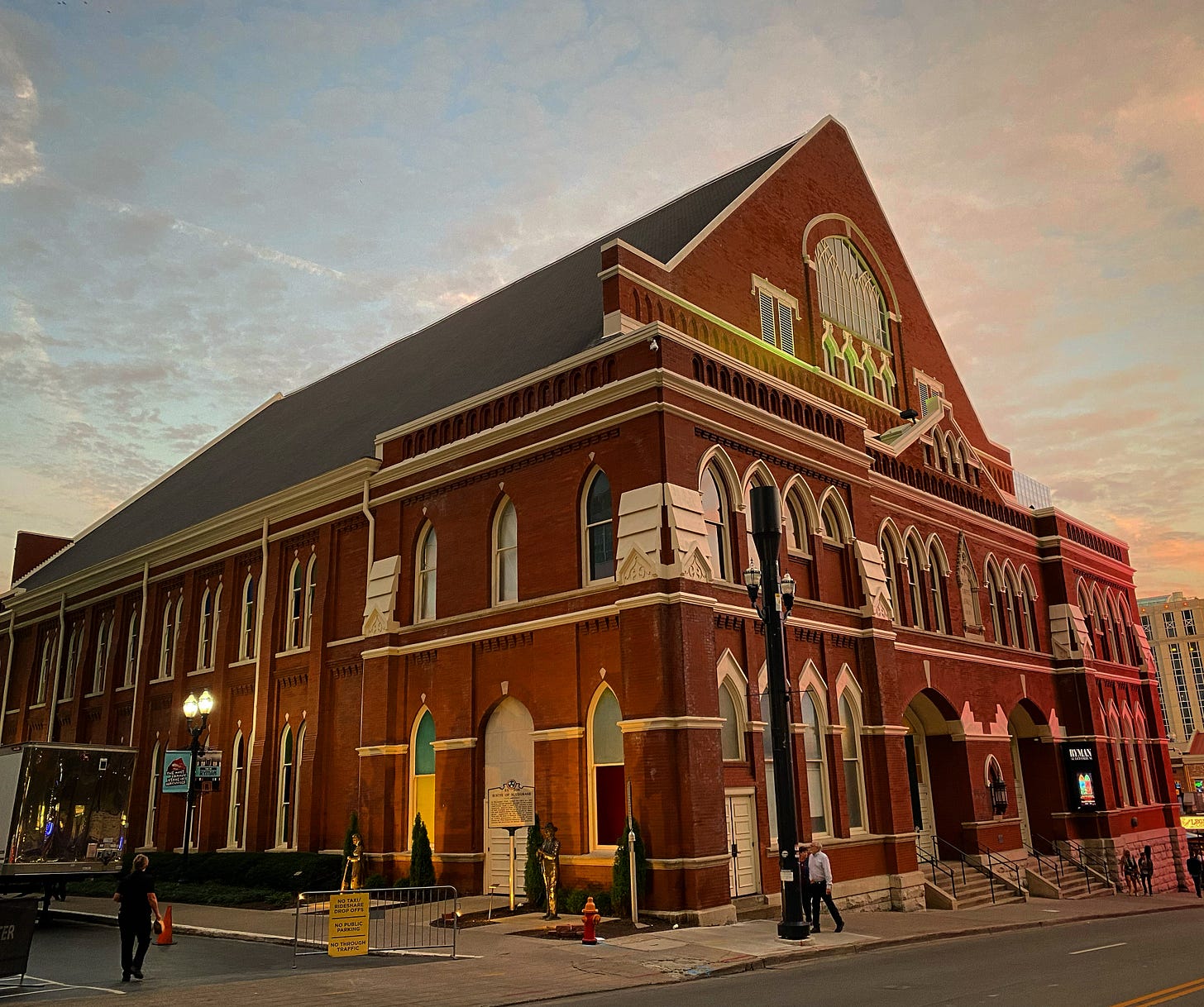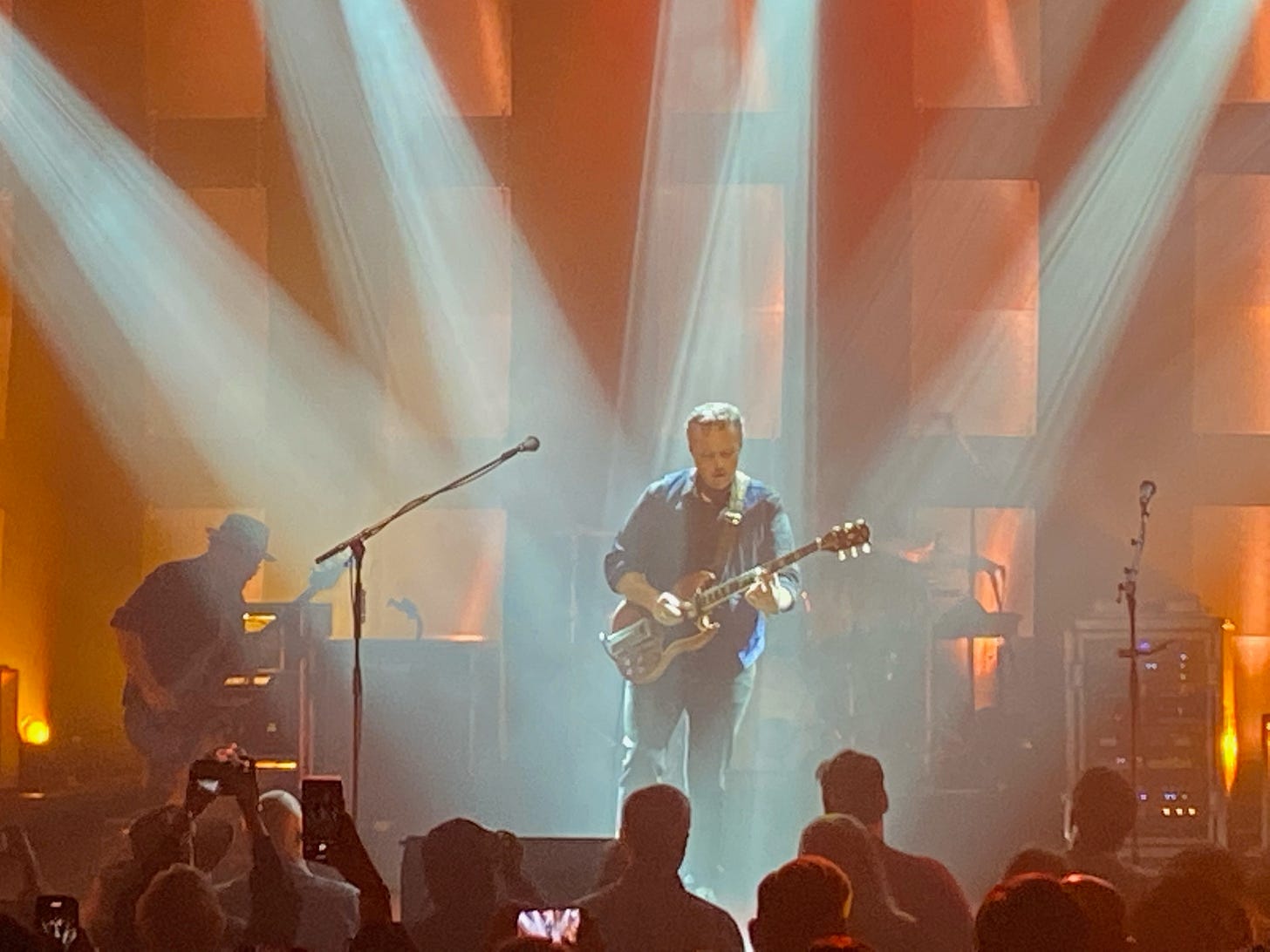Cup of Coffee: October 21, 2021
Atlanta and Houston are each one win away from a World Series matchup, I saw Jason Isbell at the Ryman last night, and I review Nick Offerman's new book.
Good morning from Nashville! And welcome to Free Thursday!
I flew to Music City yesterday afternoon for last night’s Jason Isbell concert at the Ryman Auditorium. I fly back home this afternoon. I’ll talk about the concert below, but for the time being, know that (a) I had a good time; and (b) because of travel and the concert, I did not see yesterday’s games live and thus I’m working from video highlights and box scores and game stories. Of course I do that with most of the games I talk about all year, so I don’t suppose that matters, does it?
Beyond the LCS games the Brewers fired their hitting coach, the normies are starting to grok how bad the gambling content is, and your Gen-X sports fan childhood is now an NFT. Congratulations.
In Other Stuff, beyond the Isbell content, it’s book day, I suppose. A story about fandom in The Athletic was basically like sending up the Craig Signal, I read and reviewed Nick Offerman’s new book about The Great Outdoors, and I read some reviews of a book about nothing less than the development of goddamn humanity that make me want to devour it the moment it comes out next week. Of course I talk big and end up watching more TV than I read books, but maybe this time I’ll power through.
Oh, and there’s just one more thing.
Let’s get at ‘er.
And That Happened
Astros 9, Red Sox 1: As I was pregaming for the concert I saw a lot of tweets about how Chris Sale was back, baby! Only for a while, it seems, as Houston unloaded for five runs in the sixth en route to another big blowout. Meanwhile their man, Framber Valdez, was perfect until the fifth inning and ended up allowing only one run on three hits over eight. I wasn’t aware that starting pitchers were allowed to work eight innings in the postseason anymore. I hope no one squeals. Houston can clinch at home on Friday
Atlanta 9, Dodgers 2: Huascar Ynoa, Atlanta’s would-be opener in what was to be a bullpen game in Game 4, was scratched due to tightness in his right shoulder and was taken off the postseason roster yesterday afternoon. In his press conference explaining the move, Atlanta manager Brian Snitker said his plan was to “give Jesse Chavez five, six hitters and then let Drew Smyly take a run at it.” That sounds a hell of a lot more like something you’d say during the first week of spring training before playing an exhibition against Sarasota Community College, not in Game 4 of the LCS, but I suppose that's baseball now.
In the event, the Chavez part worked as he had a scoreless inning. L.A. scored two off Smyly but after that, though, it was bupkis, with four Atlanta relievers combining for four and two-thirds shutout innings to close it out. Meanwhile, Eddie Rosario homered twice and Adam Duvall and Freddie Freeman also each homered for Atlanta’s first win in Los Angeles since, I’m pretty sure anyway, the Walter Alston era. Now Atlanta is one win from their first pennant in 22 years. Of course last year the Dodgers trailed 0-2 and 1-3 against Atlanta in the NLCS before coming back to win three straight games and the pennant, so no one is counting their chickens before they hatch, I don’t figure.
The Daily Briefing
Brewers fire their hitting coach
The Milwaukee Brewers have fired hitting coach Andy Haines. This after the club scored a total of six runs in their four-game National League Division Series loss to Atlanta. They’re letting assistant hitting coach Jacob Cruz go too.
Haines had been the hitting coach for the last three seasons. Milwaukee finished 12th in runs per game in the majors in 2021 but they ranked just 27th out of 30 in batting average and 20th in OPS. Not the most sustainable to score runs and, in the end, they didn’t score runs when it mattered the most.
This is what it’s all about in October, baby!

The “Free Pete Rose” hashtag can go to hell, but the notion that this is what MLB and its partners are pushing, and that no one besides them wants it, is a good one.
Not that such a thing is a new sentiment from me. I am noticing, however, that the sentiment is being picked up now by a lot of casual fans and folks who only start to pay a bit of attention to the sport once the playoffs start.
Your Gen-X childhood is now some blockchain abomination
If you were a sports fan kid in the 80s or early 90s, you’re likely familiar with John Costacos posters, even if you don’t know that name. They were the posters featuring athletes in, well, rather ridiculous but somehow kinda cool (at least to a kid) settings. This sort of thing:
Or this:
Between 1986 and 1996, Costacos Brothers sold more than 30 million of these things somehow. And now they’re back. And they’re terrible in a new way:
Now, a quarter century later, the iconic artist is back, armed with $4.5 million of private investment capital and a treasure trove of I.P. Launching a blockchain-based digital collectibles company, he plans to reimagine his legendary poster series and create new digital artwork as NFTs.
Justin Moorad, the son of former player agent and MLB owner Jeff Moorad, is leading the new venture as its CEO. He acknowledges the marketplace for non-fungible tokens is crowded (and filled with money grabs), but he says the company’s emphasis on high-quality art will set it apart—just like it did for Costacos’ poster business decades ago.
I’m not sure that I’d call “Roboback” or “Wizard of Boz” “high-quality art,” but I suppose I’m the wrong guy to ask about this sort of thing.
Other Stuff
Jason Isbell at the Ryman
So that was a night.
I’ve seen Jason Isbell and his band three or four times now, and each show has been spectacular. Nothing, however, compared to last night’s show at the incomparable Ryman Auditorium. It was otherworldly. Like, damn nigh tear-inducing on a couple of occasions as I got overwhelmed by the feels. Maybe it’s because the forum is so intimate and the sound is so perfect. Maybe it’s because Isbell just happens to write songs that hit guys around my age and at my place in life just right. Probably both.
Highlights included “24 Frames” and “If We Were Vampites,” which are among my favorites of his songs, two songs from that recent Georgia covers album, “Georgia Blue” (Drivin’ and Cryin’s “Honeysuckle Blue” and Cat Power’s “Crossbones Style”), “Children of Children” which has been an absolute show-stopper each time I’ve seen him, the popular Drive-By Truckers classic “Decoration Day,” and the essential “Cover Me Up.”
Maybe the biggest treat, though, was the encore’s opener of the Warren Zevon song “Mutineer,” done as a duet between Isbell and his wife, Amanda Shires (they did it once on the Letterman show many years ago if you wanna see it).
The playlist:
Go It Alone
Hope the High Road
Overseas
24 Frames
Something to Love
What've I Done to Help
Honeysuckle Blue
Cross Bones Style
Dreamsicle
Children of Children
Decoration Day
Last of My Kind
If We Were Vampire
Stockholm
White Man's World
Be Afraid
Cover Me Up
Encore:
Mutineer
Codeine
Phew. I need a day to process all of that. Talk amongst yourselves.
What is a fan in 2021?
A story in The Athletic talks about the massive explosion in popularity of English Premier League soccer and, in light of that, what it truly means to be a fan of a Premier League Club in 2021. The hook of it all is, basically “until relatively recently, to be a Premier League fan you had to actually go to matches and be a hardcore lifer but now that it’s on TV all over the world and it can be followed on the Internet, ANYONE can claim to be a fan in any number of ways!”
As you may or may not know because I hardly EVER mention it, I just wrote a book about different ways to think about fandom and different ways to be a fan. As such, the notion that fandom can change and manifest itself in a zillion different ways — and that it need not adhere to old notions of “die hards” who are venerated vs. “casual fans” who are derided — is right the hell up my alley.
The story here, quite helpfully, notes a couple of different ways in which one can become a fan of something despite not being a local who shows up at the stadium 15 times a year and can recite every fact you can imagine about the club and its history. One can be a TV-only fan from halfway around the world who never has never will step foot in England. One can get into a club from afar because it serves as some social grease in an existing relationship. One can come to the sport not through matches but through video games and communities on social media — and can spend more time in that world of metafandom than in actually watching games — and that is a perfectly legitimate means of interacting with and enjoying sports. This goes for all sports, of course, not just soccer.
Ultimately, I want the traditional knowledge/purity tests and other forms of gatekeeping that revolve around fandom, and the idea that there is some sort of hierarchy at play which legitimizes some sorts of fandom and stigmatizes others, to become a relic of history. As this story makes clear, the world of soccer fandom is, at least around the edges, starting to move in that direction. All sports should.
Maybe that’ll piss off some ultras, but I kinda don’t care. In part because no one is telling them they can’t be an ultra fan (indeed, all of us who have rethought fandom are helping underwrite their passion so they should thank us rather than scorn us). In part because, hey, I may sell a few books if people get all uppity about these concepts. :-)
Where the Deer and the Antelope Play
There’s a Cup of Coffee subscriber you may know by the name of Nick Offerman who, despite being a Chicago Cubs fan, is a pretty damn sensible fellow. That sensibility is on full display in his latest book, Where the Deer and the Antelope Play: The Pastoral Observations of One Ignorant American Who Loves to Walk Outside. It was published on October 12. I finished it yesterday. It’s a fine, funny, and thoughtful book and I highly recommend it.
Offerman’s titular observations are about how nature is important, wonderful, occasionally magical, potentially restoring and all of us should spend a hell of a lot more time out in it than we do. The book is not, however, a mere adventure or travel memoir or some act of boosterism for National Parks. There are depths here and a lot of deft social commentary that, while not exactly flying in the face of what you may have read from other writers who like to go for walks in the woods, will make readers coming at it from almost any perspective you can imagine stop and think a great deal more than those sorts of books tend make them. This comes from his digressions about history, social trends, and social justice. It also comes when he drops context-appropriate bits of wisdom from his favorite writer, Wendell Berry, such as this, which I wish more of our leaders would take to heart when they think about the environment, climate, and ecology:
“Whether we and our politicians know it or not, Nature is party to all our deals and decisions, and she has more votes, a longer memory, and a sterner sense of justice than we do.”
Nature will be just fine. We may be screwed, however.
The first part of the book features Offerman and his friends, Wilco singer/songwriter Jeff Tweedy and Booker Prize-winning author George Saunders, hiking and rafting in Glacier National Park. Offerman, however, doesn’t do what you might expect from an actor-turned writer and merely tell some anecdotes and try to make some point about it all at the end of the section. Rather he weaves in information and commentary about the park, including an important nod to its original inhabitants, who are usually written out of the history of our National Parks, even by those who should know better, in a rush to make erroneous reference to our “pristine” and “untouched” wilderness. It was touched folks, for thousands of years before John Muir and Teddy Roosevelt were alive.
Offerman also engages in some good discussion about the fetishization of expensive outdoor gear, the glory of the Civilian Conservation Crops and WPA, the privilege of white dude hikers who never have to worry about being assaulted while out hiking or running, the dark humor surrounding bear attacks, and a million other things, all while still telling funny and entertaining tales about he and his pals walking in the woods. A lot of entertainers write books. Only a few are good writers. Offerman is one of them and it makes this a nice, breezy read.
In the second part of the book — after a fun story about how both Offerman and his wife, Megan Mullally, have each made out with Rob Lowe — he goes to England where he visits an organic sheep farm owned by the farmer/writer James Redbanks, which was described in his 2015 book The Shepherd’s Life. There he helps Redbanks repair stone walls and rails against agribusiness, fueled by the books’ earlier references to Berry and his advocacy for “morally sound land use” which Offerman clearly shares. You don’t think farming can be radical? It sure as hell can. As was the case with the first part, though, Offerman’s down-to-Earth everyman voice keeps things grounded, as he makes fun yet mostly still-on-point digressions about things like Neil Young songs from “Rust Never Sleeps” and how funky the town of Santa Cruz is.
In Part III he and Mullally, now stuck with the rest of us in the pandemic, decide to buy an Airstream Globetrotter trailer, nicknamed “The Nutmeg,” with an aim toward using it to drive all over the country for a couple of months, ending up with Offerman’s family in Illinois for what would prove to be an awkward Thanksgiving dinner. A dinner that inadvertently lays bare the different experiences people in different parts of the country in different economic strata have experienced during the pandemic. As was the case in Part I, Offerman, despite political and social leanings which are in no way hidden in this book, is able to talk about these cultural divides in ways that attempt to humanize, rather than demonize, people who inhabit different worlds than he and Mullally do. There’s not much of that happening lately, in print or otherwise, and it serves as hope that, maybe, the fever which has gripped this nation for the past five or six years is a temporary one.
I’ll close this review on a less serious note: as someone who grew up going on countless RV trips with my family, the final section of the book gave me some serious RV PTSD (note: full hookups MATTER). Likewise, as someone whose parents spent several years earlier in their retirement as full-time RV people, the stuff Offerman and Mullally didn’t know about what they were getting into with their giant Airstream and the Unwritten Rules of Campground Life simultaneously broke and warmed my heart. OK, maybe that’s putting it too strongly. But I did say, out loud, “bless their hearts” while shaking my heads several times. Even better: it made me imagine a pitch for a remake of the 1954 Lucille Ball-Desi Arnaz film “The Long, Long Trailer” starring Mullally and Offerman. Someone get a producer on the phone. I’ll take the first crack at the screenplay.
I’ve gone on too long here, but hey, I’m in a hotel room waiting to go see a concert and I have the time. Anyway: go grab Where the Deer and the Antelope Play. It’s pretty damn spiffy.
The Dawn of Everything
Now to go from a book I just read to a book I plan to read in the future.
The Dawn of Everything: A New History of Humanity comes out in a couple of weeks. It’s by the late anthropologist/activist David Graeber and archaeologist David Wengrow. And based on a couple of reviews I’ve read of it this week, it sounds absolutely astounding.
The idea: there’s this notion out there — which almost all of us take to be gospel — that civilization’s development was linear. That we went from primitivism to agrarianism to living in big cities with complex governmental and economic laws and conventions and that there was no other way for that dynamic to have progressed. Indeed, it went that way, the story goes, because that’s how humans themselves progressed. From basic and practically feral to sophisticated and intellectual. And, of course, that which persists now is thus, by definition, the apotheosis of humanity.
What Graeber and Wengrow’s book presupposes, however, is what if that’s bullshit?
The Dawn of Everything posits — based, my joke notwithstanding, not on a presupposition but on exhaustive anthropological and archeological research — that humans lived in large, complex, but decentralized communities for thousands of years. That we dipped in and dipped out of things like agriculture vs. hunting and gathering or democracy vs. autocracy and pastoral living vs. urbanism at various points way before and way after that dominant notion of history tells us we did.
The key takeaway: that we did so via conscious choice, too, showing that our ideas about which forms of social organization are superior — because we portray them as coming later in what we erroneously presume to be evolutionary development — and which are inferior — because we portray them to be antiquated and obsolete — are fundamentally wrong. And that we still have choices about how to organize society that go far beyond the very narrow band of which particular form of urbanized capitalism we most prefer.
It sounds like a hefty tome, of course, and my eyes are often bigger than my stomach when it comes to large, Big Idea books, but I’m gonna at least give this one a whirl.
Just one more thing . . .
For the first few moments of this song you may wonder why I’m linking it. But if you give it until about the ten second mark, all will become clear.
Apparently the sample was a tribute to Nia Archives’ Grandma Liz, who was a big fan of “Columbo.” Because, really, who wouldn’t be?
A hat tip to Bobby Thomson for bringing this to my attention. There is art everywhere if you look hard enough, you guys.
Have a great day, everyone.









Ordered the Offerman book based on your recommendation. Holding off on ordering the “Big Idea” book until you report back from the field. On the “nature will be just fine” point, I’ve often had this thought, but never more fully-realized than this past summer, when dear wife and I stayed at a VRBO just northeast of Eureka Springs, AR. The house was built along the hillside over a valley, and featured a view off the back deck where you could see deep into Missouri - absolutely beautiful. But it dawned on me (literally) one morning when we were sitting on that deck having our coffee, that the beauty we were in such awe of was, in fact, what passes for jungle in this country. And that, were this beautiful rental house with this beautiful view to be ignored for, let’s just say 12 months, the jungle would roll right over the top of it and reclaim it like it was a chapter in “Annihilation.”
Just checked the library website and they have one copy of Offerman's book, and it's not checked out. It will be in my hands in a couple of days when they transfer it to the library closest to me for pickup.
I have to say one good thing that came from the pandemic is it got me in the habit of checking the library first, before buying a book.
I was in the Ryman 3 or 4 years ago. I was in Nashville for a work conference and flew in a couple of days early to visit the town before the conference. I stayed in a Vanderbilt student's spare bedroom for $25 a night. Gotta love Air BnB. I was just in the Ryman in the afternoon, there was no show or anything going on. There was a highschool choral group in there too, maybe 20 kids, that decided to check off sing in the Ryman from their bucket list. They way those 20 odd kids voices filled the room was magical. I can only imagine was Isbell and the 400 sounded like. The acoustics in that place are unbelievable.